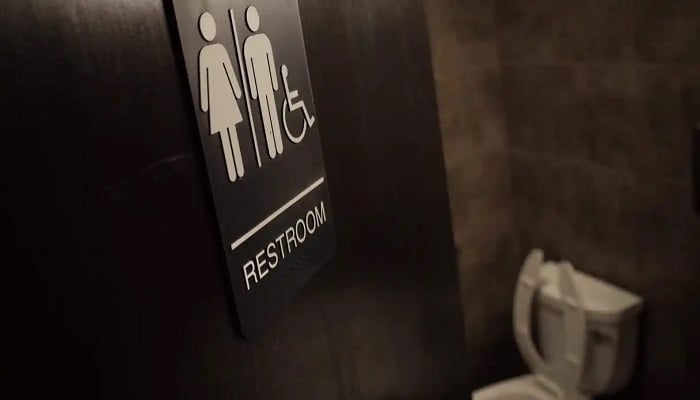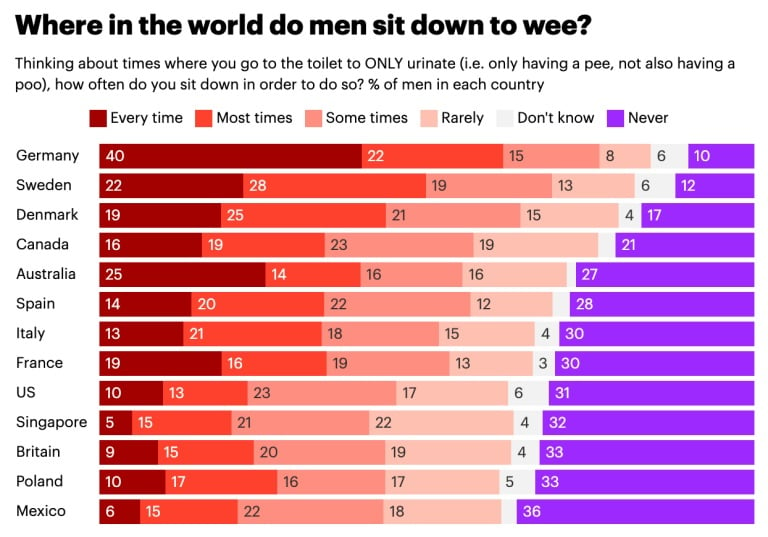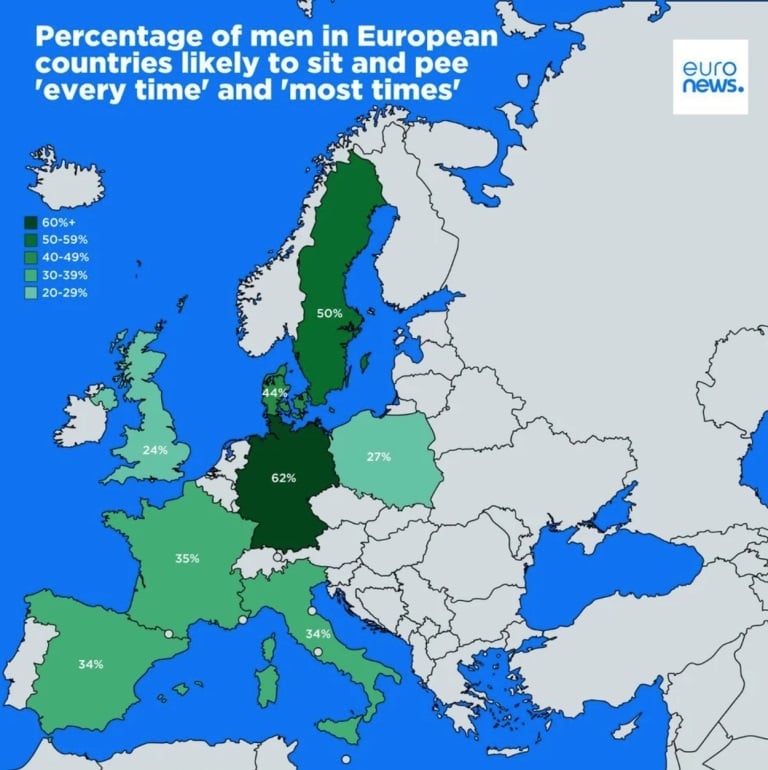Sitzpinkler: Why men in Germany relieve themselves sitting down
Report argues this linguistic phenomenon may reflect and shape cultural attitudes and practices surrounding gender roles and personal habits
May 27, 2023

The Sapir-Whorf hypothesis suggests that language influences culture, and supporting evidence can be found in various examples.
One such illustration is the German language, known for its abundance of single words that encapsulate concepts requiring lengthier descriptions in other languages, Big Think reported.
According to the report, an interesting example is the word "Sitzpinkler," which refers to a man who urinates while sitting down.
It is noteworthy that not only does the German language have a specific term for this, but there is also a perceived proficiency in this behaviour among Germans compared to individuals from other nationalities.
The report argued that this linguistic phenomenon may reflect and shape cultural attitudes and practices surrounding gender roles and personal habits.
The findings of a comprehensive survey conducted by UK-based pollster YouGov regarding men's urinating preferences were recently released.

This map specifically focuses on eight European countries included in the survey, while additional countries surveyed were Canada, the United States, Mexico, Singapore, and Australia. Among all 13 countries, Germany stood out as the nation where the highest percentage of men reported sitting down to urinate "every time" (40%).
When combined with those who do so "most times" (22%), the map reflects that nearly two-thirds of German men are Sitzpinklers (without the final "s," as the term is both singular and plural). The data from this survey provides an interesting insight into the cultural variations in urination habits across different countries.
In terms of men's urination habits, German men surpass their counterparts in other countries, with a significant majority (40%) reporting that they sit down "every time." Sweden follows in second place, but with a notably lower percentage of men (22%) sitting down "every time."
However, a larger portion of Swedish men (28%) do so "most times." Danish men secure the third position overall, with 44% of them sitting down consistently. Australians (39%) and Canadians (35%) rank closely behind in fourth and fifth place, respectively.
The urination habits of French (35%) and Italian (34%) men almost intersect, indicating a similar overall preference. However, it is worth noting that a considerably larger proportion of French men (19%) sit down "every time" compared to their Italian counterparts (13%). Poland (27%) and the UK (24%) find themselves at the lower end of the European rankings, with only 10% of Polish men and 9% of British men consistently sitting down to urinate "every time." These results showcase the variations in urination practices across different European countries.
The United States ranks relatively lower on the scale, with only 10% of American men consistently sitting down to urinate, along with an additional 13% doing so "most times." This percentage, however, is higher compared to Mexico and Singapore, where only 6% and 5% of men, respectively, sit down to urinate "every time."
The proficiency of German men in sitting down to urinate is a relatively recent phenomenon. One notable marker of this cultural shift is the introduction of a device called the Spuk (also known as the "toilet ghost" or WC-Geist) in Germany in 2004. This device is placed under the toilet seat and, when a man lifts the seat to aim at the bowl, it emits a voice message requesting that the seat be returned to its horizontal position and encouraging the individual to urinate while sitting down. To add more authority to the message, the warning can even imitate the voices of prominent figures such as Angela Merkel, Helmut Kohl, or other former chancellors. This innovation reflects efforts to promote the practice of sitting down while urinating among German men.
The United States ranks relatively lower on the scale, with only 10% of American men consistently sitting down to urinate, along with an additional 13% doing so "most times." This percentage, however, is higher compared to Mexico and Singapore, where only 6% and 5% of men, respectively, sit down to urinate "every time."
The proficiency of German men in sitting down to urinate is a relatively recent phenomenon. One notable marker of this cultural shift is the introduction of a device called the Spuk (also known as the "toilet ghost" or WC-Geist) in Germany in 2004. This device is placed under the toilet seat and, when a man lifts the seat to aim at the bowl, it emits a voice message requesting that the seat be returned to its horizontal position and encouraging the individual to urinate while sitting down. To add more authority to the message, the warning can even imitate the voices of prominent figures such as Angela Merkel, Helmut Kohl, or other former chancellors. This innovation reflects efforts to promote the practice of sitting down while urinating among German men.

When it comes to the practice of sitzpinkeln, there is one country that surpasses even Germany, and that is Japan. Interestingly, Japan also has a word for it: suwari-shon. Over the past few decades, the prevalence of Japanese men urinating while sitting down has significantly increased. In 1999, approximately 15% of Japanese men reported sitting down, which rose to around 40% in 2007, and reached around 60% in 2020, according to various surveys.
Among those surveyed, only 12% identified themselves as "native" sitters, while nearly half stated that they had switched from standing to sitting. One possible reason for the rapid increase in suwari-shon could be attributed to Japan's well-known high-tech toilet technology, offering features such as heated seats and various jet streams that cater to those who prefer sitting.
One noteworthy trend that contributes to the growing popularity of the seated option and potentially predicts its future rise is the toilet's role as a preferred location for people to either seek refuge from the internet or, more commonly, engage with the internet. Countless social media posts are composed and consumed in the privacy of the restroom, a space even revered individuals, like kings and queens, visit on foot.









